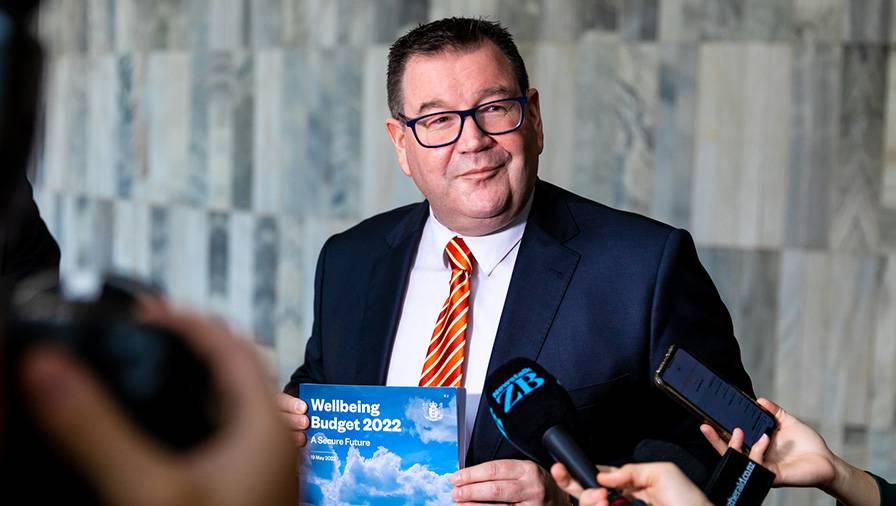$7b budget blowout: can we blame rampant inflation?
ANALYSIS: Extra spending mainly climate change initiatives and setting up new health structure.
Brent Edwards and Grant Walker debate the week in politics.
ANALYSIS: Extra spending mainly climate change initiatives and setting up new health structure.
Brent Edwards and Grant Walker debate the week in politics.
There is little doubt the Budget that Finance Minister Grant Robertson announced last week is a big spending one.
Robertson himself was keen to point out the Government had managed to trim its new spending allocation of $6 billion to $5.9b in the Budget after finding savings within existing spending allocations.
Yet total spending in this budget amounts to $127.1b, compared with the forecast of $120b in the December economic and fiscal update. And that forecast contained the $6b new spending allocation.
So, in just five months, Government spending has blown out by $7b. Much of it will have been driven by the impact of rampant inflation.
New spending allocations almost always relate to spending the Government is intending to spend on new initiatives. In this Budget’s case, the money is largely soaked up by climate change initiatives and spending on setting up the new health structure.
But spending in every budget is also driven by inflation and demand. For instance, every time an extra student enrols at school, education costs rise. The same happens with health, as a growing and ageing population puts increasing demands on the health system. Those population and demand-driven increases are not absorbed by the new spending allocation. If they were, nothing new would be done.
Predictably, Robertson’s Budget has been criticised from all sides. National and Act accuse him of spending too much, while poverty and climate advocates accuse him of spending too little.

Finance Minister Grant Robertson.
Cost-of-living surprise
Facing growing criticism over the ‘cost-of-living’ crisis, Robertson did surprise some with a package aimed at alleviating the problem for low-and-middle-income households.
Those earning under $70,000, and not eligible for the winter energy payment, will get $27 a week for three months starting on August 1. In total they get $350.
It is a help but won’t go far in making the supermarket shop a bit more affordable. None of the money is available to beneficiaries or others who do get the winter energy payment.
At the same time, the cuts to the petrol tax and road user charges, as well as half-price public transport, will be extended for another two months.
All this will cost about $1b and Robertson told reporters it was not some kind of last-minute plan in response to political pressure. The Government had apparently been thinking about how to help struggling households since last December.
A number of economists appear to believe the extra money will help, without putting undue pressure on inflation.
On Wednesday, we might get a better idea of whether the Budget is inflationary or not, when the Reserve Bank releases its May monetary policy statement. Interest rates are expected to go up again, but there will be real interest in the statement’s analysis, particularly around the fiscal impact on inflation.
In the Budget itself, despite the huge amount of spending, the Treasury picks the fiscal impulse to soon weigh against inflation as Government spending as a proportion of GDP is forecast to fall over the next five years.

Act Party leader David Seymour.
Opposition criticism
Act leader David Seymour, though, is adamant the Government should have done more; he said under Act, spending would have been between $113b and $120b, not $127b. National’s finance spokesperson Nicola Willis also believes spending is too high but refused to say by how much National would cut it.
The Government has put legislation through Parliament under urgency to force more competition in the supermarket sector. Specifically, it is stopping supermarket chains from using covenants on land from stopping competitors from setting up stores.
This will help competition, but it will not have an immediate impact on prices. There are signs that the supermarkets themselves recognise they need to rein in prices, but whether that is largely a PR campaign or something more substantial is not yet clear.
Like all budgets, this one covers a myriad of spending initiatives, including more money to buy more ambulances, as well as the overall spend on the health system. But where do the staff come from to ensure health services, including the ambulance service, can operate at the level the public expects.
Health unions have complained, for instance, there is little funding in the Budget to deal with staffing issues.
Some have also criticised the Budget for being short-sighted and having no long-term thinking.
They might disagree with the thinking, but spending aimed at climate change initiatives and at the health reforms is long-term. The climate change spending is focused on the target of net zero carbon by 2050 and the health reforms are setting up a new structure to take the health system through the next few decades at least.

Climate Change Minister James Shaw.
Climate action compromise
The Budget had been preceded by announcement of the Emissions Reduction Plan.
NBR presenter Grant Walker asked whether that was a compromise plan and, of course, it was.
The Green Party has welcomed the plan but also made it clear had it had more leverage it would have gone further in cutting emissions. There is, for example, no ban on the importation of petrol and diesel-powered vehicles, as recommended by the Climate Change Commission.
More money from the Budget will also go to subsidise industry to decarbonise and to fund developments to help farmers reduce their on-farm emissions. Some critics say they should just get on and do it themselves, with Greenpeace accusing the Government of kowtowing to farmers.
As NBR’s Tim Hunter has observed, there were also no tax changes announced in the Budget, but nor was there any expectation of that.
Willis said National’s plan to raise the income thresholds at which higher rates of marginal tax apply would have put more money into the pockets of anyone earning more than $50,000 than the Government’s temporary cost-of-living package.
It would also though ensure people on what are now modest incomes would not have to pay higher marginal rates of tax.
The debate around that will continue until next year’s election.
Meanwhile, Robertson might have delivered his Budget last week but this week he has to sell it. He has a host of speaking engagements over the next week or two, where he will try to convince his listeners the Budget has struck the right balance between spending for the future and fiscal prudence.
No doubt he hopes it will get some tick of approval from the Reserve Bank on Wednesday.
Brent Edwards is NBR’s political editor.